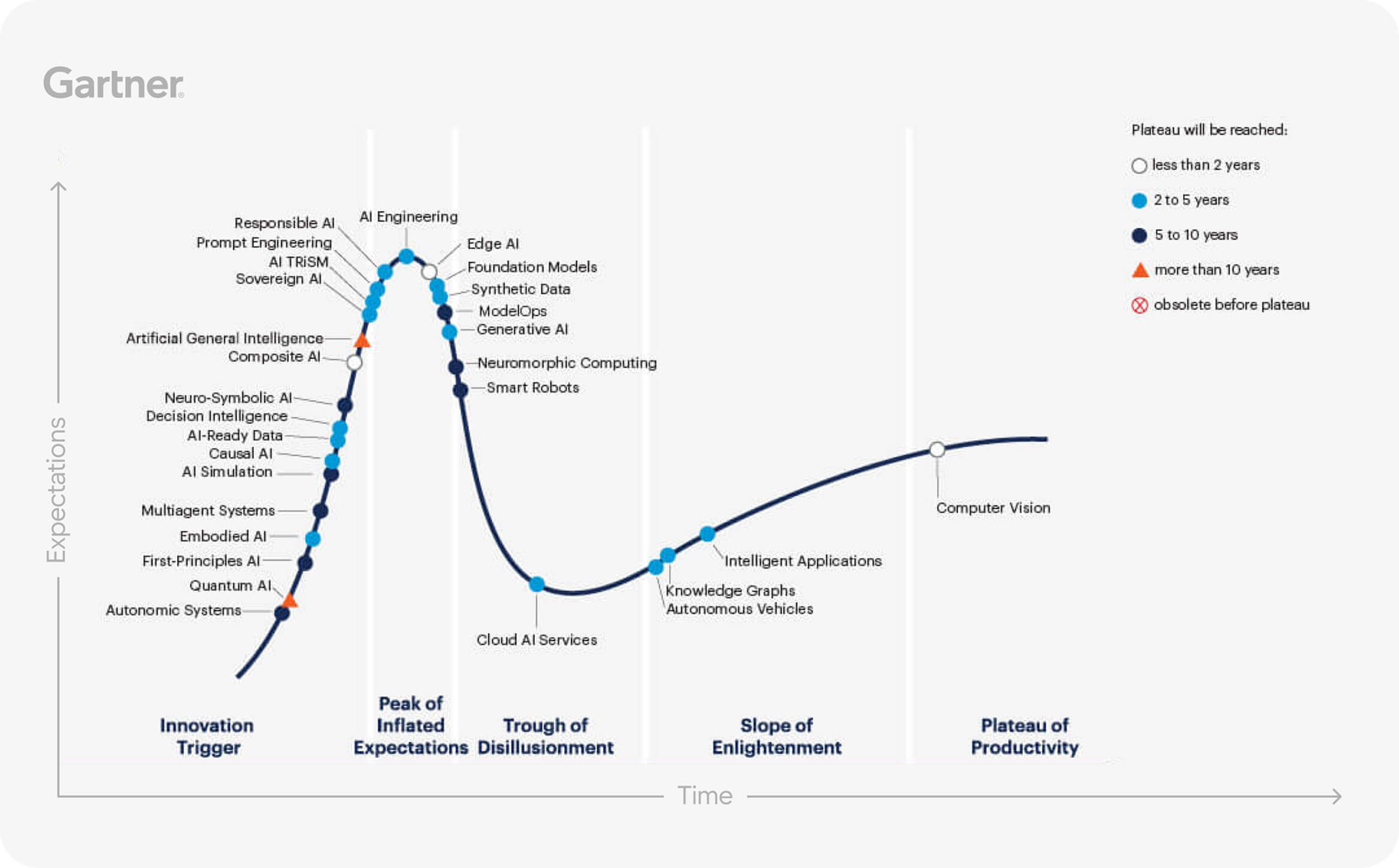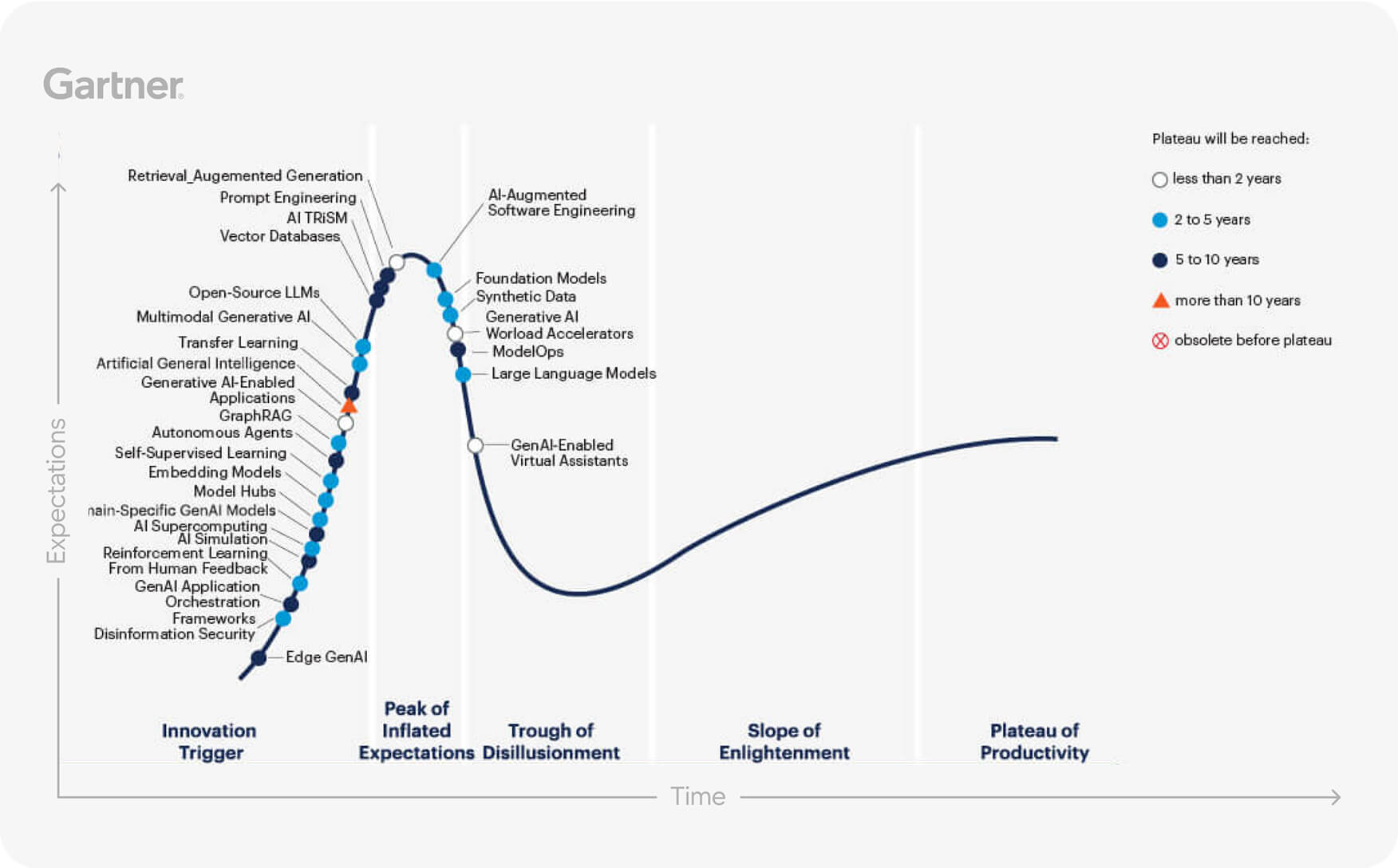Artificial Intelligence (AI) is no longer a futuristic concept. It has firmly integrated itself into both our everyday routines and business operations — including real estate marketing. But while AI offers significant opportunities, using it effectively requires more than just enthusiasm. It requires strategy, a clear understanding of where the technology stands, and realistic expectations.
In this article, we’ll explore how to approach AI in real estate marketing wisely — without falling into the trap of hype or overpromising results.
Understanding the AI Hype Cycle
New technologies don’t become mainstream overnight. It takes years for innovations to evolve from early prototypes to widely adopted tools that provide measurable value.
To better understand how technologies develop over time, Gartner — one of the world’s leading IT research companies — introduced the Hype Cycle.

This model outlines five key phases of technology adoption:
- Innovation Trigger: A promising technology emerges.
- Peak of Inflated Expectations: Optimism skyrockets. Companies rush to implement the technology, expecting rapid results.
- Trough of Disillusionment: The first setbacks appear. It usually comes along with disappointment since many projects fail to deliver expected outcomes
- Slope of Enlightenment: Realistic applications start to emerge. Early users refine their approaches and begin to see positive results.
- Plateau of Productivity: The technology matures and proves its business value. Adoption becomes mainstream.
This framework helps us understand the stage where each technology is situated right now.
Currently, most AI tools in real estate marketing are still in the early to mid-stages of this cycle. Some are already delivering value, while others are still experimental or lack strong business cases. That’s why it’s so important to analyze each tool’s maturity before adopting it.
The Rise of Generative AI in Real Estate
Among the different AI technologies, Generative AI (GenAI) has gained the most traction in marketing and sales. GenAI refers to AI systems that can create content — from text and images to audio and video. Tools like ChatGPT, Midjourney, and Synthesia have shown strong potential across various industries, including real estate.
If we look at the curve, we can see that most GenAI solutions are still positioned in the first two stages of the Hype Cycle.

In 2025, GenAI is expected to become a core element of real estate marketing. It enables professionals to:
- Create personalized, high-performing content at scale<
- Streamline marketing workflows and reduce production time
- Analyze audience behavior and optimize messaging
- Improve targeting and campaign effectiveness
When implemented properly, GenAI can lead to higher engagement, improved conversion rates, and greater operational efficiency.
AI Tools in Real Estate Marketing right now
Let’s take a closer look at how AI is already being used in real estate today — and where it’s showing the strongest results.
1. AI-Powered Chatbots and Virtual Assistants
Chatbots based on platforms like Chatfuel or Userbot can manage routine client communication on websites or messaging platforms. They:
- Respond to inquiries instantly, improving customer experience
- Pre-qualify leads – sometimes even better than live operators
- Schedule appointments and sync with calendars
- Transfer qualified leads to human agents when necessary
- Take notes and summarize calls
Our own solution at CallGear also falls into this category. AI Call Assessment is designed to automatically summarize phone conversations, highlight key moments, qualify leads, and notify managers about complex or potentially problematic cases. This tool has already proven its value in practice. For example, a Toyota dealership in Kazakhstan was able to reduce call analysis time by a factor of five, while improving manager performance by 30%. You can read the full case study.
2. AI-Based FAQ and Knowledge Systems
Real estate agencies often have extensive internal documentation and FAQs. AI to ols can turn this content into interactive knowledge bases, capable of delivering accurate answers to both clients and team members in real time.
This enhances self-service options for customers and reduces pressure on support staff — especially in high-loads hours.
3. AI Content Generation Tools
As the saying goes, “content is king.” With generative AI tools it becomes faster and more cost-effective to produce high-quality and relevant marketing materials.
Popular tools include:
- ChatGPT for copywriting
- Midjourney for visual design and illustrations
- Synthesia or Pictory for video creation and voiceover
You can generate content for:
- Blog articles
- Property descriptions
- Email campaigns
- Social media posts
- Advertising visuals
For real estate professionals, this means more time to focus on strategy and less time spent on repetitive creative tasks.
4. Virtual Tours
Virtual tours are an increasingly popular way to showcase real estate properties. They improve engagement, speed up decision-making, and offer remote viewing for international clients.
Previously, these tours were expensive and time-consuming to produce. AI-based platforms like Matterport have simplified the process dramatically. Today, agencies can create immersive 3D tours in-house — at a fraction of the previous cost and effort.
5. Other tools, not fully established yet
AI tools are evolving to support real estate sales teams at every stage of the customer journey. While not yet fully mature, the newest solutions are capable of:
- Automate inbound and outbound lead management and follow-ups.
- Assist or copilot sales teams
- Automate sales processes and advanced workflow
These systems help agents stay on top of their pipeline and reduce the risk of losing promising leads due to human error or lack of follow-up.

How to Approach AI Adoption Strategically
While AI holds great potential, the key to successful implementation is a measured, strategic approach. Here are three principles we recommend:
- Start small, scale fast.
Begin with one or two tools that solve a clear business problem — such as content creation or lead qualification — and expand from there once results are validated. - Focus on real value, not hype.
Choose tools with proven use cases and integrations. Avoid solutions that offer little more than novelty or promise “miracles” without evidence. Don’t hurry and use the Gartner Hype Cycle to choose the right tool. - Invest in training and adaptation.AI is only effective when your team knows how to use it. Set aside time and resources to onboard, train, and adjust workflows accordingly.
Final Thoughts
AI — especially generative AI — is reshaping real estate marketing. But like any tool, it needs to be applied with purpose, not just curiosity. By understanding where AI tools are in their development lifecycle, and by focusing on practical, business-driven use cases, real estate companies can adopt AI technologies that drive real, measurable outcomes.
In the coming years, those who learn how to integrate AI into their marketing strategies — responsibly and intelligently — will gain a distinct competitive edge.
And remember that AI isn’t just the future, it’s already here.

